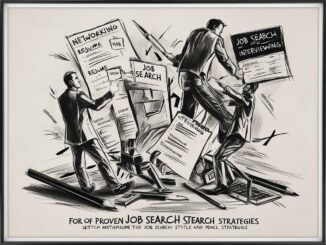
Starting a job search can feel overwhelming, especially if you’re unsure where to begin. However, with the right approach, you can set yourself up for success from the very first step. This guide will walk you through how to start a job search the right way, covering essential steps like setting clear career goals, researching the job market, and crafting a winning CV. By following these expert tips, you’ll gain the confidence and tools needed to land your dream job. Let’s dive into the first steps of your job search journey.
Setting Clear Goals for Your Job Search
The foundation of any successful job search begins with understanding what you want to achieve. Setting clear goals gives you direction and keeps you motivated, even when the process feels challenging. Here’s how to start a job search by defining your career goals effectively:
Why Goal Setting Matters
Without a clear idea of what you’re aiming for, your job search can feel aimless. Setting goals helps you focus your efforts on opportunities that align with your aspirations, saving you time and energy.
Reflect on Your Career Aspirations
Take a moment to think about your long-term vision. Ask yourself:
- What kind of role excites me?
- Which industries interest me most?
- Where do I see myself in five years?
For example, if you’re passionate about technology and want to work in a creative role, you might aim for a position like a digital marketing specialist in the tech sector.
Assess Your Strengths and Weaknesses
Next, evaluate your skills and experience. What are you good at? Where could you improve? This self-assessment will help you identify roles that match your strengths and highlight areas where you might need to upskill. For instance, if you’re great at problem-solving but lack experience with data analysis, you could target entry-level roles while pursuing relevant training.
Set SMART Goals
For any successful job search you’ll need to make your goals actionable. To make your goals actionable, use the SMART framework—Specific, Measurable, Achievable, Relevant, and Time-bound. Instead of saying, “I want a new job,” try: “I want to secure a project management role in healthcare within six months.” This clarity keeps you on track and makes your progress easier to measure.
By setting clear goals, you’re not just figuring out how to start a job search—you’re building a roadmap to success.
How to Optimize your CV for ATS Systems
Researching the Job Market
Once you’ve defined your goals, the next step is to explore the job market. Researching trends, industries, and opportunities ensures you’re targeting the right roles and employers. Here’s how to approach this crucial phase:
Understand Industry Trends
Start by looking at what’s happening in your field of interest. Are certain skills in high demand? Are specific industries growing? Websites like LinkedIn, Glassdoor, and industry blogs can provide insights. For example, if you’re eyeing a career in renewable energy, you might find that skills in solar technology are increasingly sought after.
Identify Potential Employers
Make a list of companies that align with your goals. Research their culture, values, and recent news to see if they’re a good fit. Visit their websites and check their “Careers” pages for openings. If you’re interested in a company like Google, for instance, learn about their hiring process and the skills they prioritize.
Leverage Job Boards and Networks
Use platforms like Indeed, Monster, and LinkedIn to find job listings that match your criteria. Search using keywords related to your goals, such as “entry-level marketing jobs” or “remote software developer positions.” Additionally, consider attending industry events or conducting informational interviews to uncover hidden opportunities.
Thorough research helps you refine your job search strategy and positions you as a proactive candidate. It’s a key part of how to start a job search effectively.
Secrets to a Successful Job Search – Crafting a Winning CV and Other Materials
Your CV is often the first thing employers see, so it needs to make a strong impression. Alongside your CV, other materials like cover letters and your LinkedIn profile play a vital role in showcasing your qualifications. Here’s how to prepare these essentials:
The Importance of a Standout CV
A well-crafted CV is your ticket to an interview. It should highlight your skills and achievements while being easy to read. As you learn how to start a job search, prioritize creating a CV that grabs attention.

Key Elements of a Winning CV
Include these sections:
- Contact Information: Name, phone number, email, and LinkedIn URL.
- Professional Summary: A brief 2-3 sentence overview of your skills and goals.
- Work Experience: List jobs in reverse chronological order, focusing on achievements (e.g., “Increased sales by 20%”).
- Education: Include degrees and relevant certifications.
- Skills: Highlight both hard skills (e.g., Python) and soft skills (e.g., teamwork).
Use bullet points for clarity and action verbs like “managed,” “developed,” or “analyzed” to describe your accomplishments.
Tailor Your CV to Each Job
Generic CVs rarely stand out. Customize your CV for each application by matching your experience to the job description. If a role emphasizes leadership, highlight your team management experience. This shows employers you’re a perfect fit.
Write Effective Cover Letters
A cover letter complements your CV by explaining why you’re interested in the role and how your skills align with the company’s needs. Keep it concise (about 300 words) and personalize it for each application. For example: “I’m excited to apply for the Marketing Coordinator role at [Company] because of my passion for data-driven campaigns.”
Optimize Your LinkedIn Profile (a Job Search No-Brainer)
Many recruiters use LinkedIn to find candidates, so ensure your profile shines. Add a professional photo, write a compelling headline (e.g., “Aspiring Data Analyst | Skilled in SQL and Tableau”), and flesh out your summary with keywords like “job search ready” or “experienced project manager.” List your experience and skills, keeping them consistent with your CV.
By preparing these materials, you’re not only answering how to start a job search but also positioning yourself as a polished, professional candidate.
Conclusion
Starting a job search doesn’t have to be intimidating. By following these first steps—setting clear goals, researching the job market, and crafting a winning CV—you’re laying a solid foundation for success. Each step builds on the last, helping you approach your job search with confidence and purpose. The journey to your dream job begins with action, so take the first step today. Whether you’re exploring career planning, seeking job search tips, or perfecting your resume, persistence and preparation will pay off. Your next opportunity is waiting—go find it!




1 Trackback / Pingback
Comments are closed.